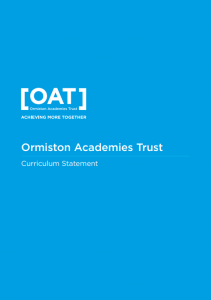Curriculum Overview
At Ormiston Denes Academy, we are passionate about ensuring students leave us having fulfilled their potential in a broad range of subjects and have the opportunity to succeed at the highest level. As such, the curriculum we offer gives the balance of a wide curriculum base in Year 7, 8 and 9 before allowing students to specialise in the subjects they enjoy the most in Year 10. PSHE, RE and PE are ingrained throughout the curriculum. We aim that all aspects of our school life inspire students to have aspirations and be ambitious. We enhance our student’s life choices and create social justice by ensuring our curriculum is designed for all students to have rigorous academic challenges, whilst enabling all our students to make positive life choices so they are healthy, polite and respectful.
Years 7, 8 and 9 are organised so that all students cover a broad range of subjects. There is a standard core curriculum of English, mathematics, science and physical education. Students also study geography, history, personal social and health education (PSHE) and religious education. Technology and performing arts works on a rotation and include technology, art, catering, IT, music, dance and drama. All students have the opportunity to specialise in one of three languages: French, German and Spanish.
Students in Years 10 and 11 continue the core curriculum of English language and English literature, mathematics, biology, chemistry, physics, PSHE/ RE and physical education. In Year 9, students make the decision on their option choices for the start of Year 10, either continuing to develop their subject knowledge from Key Stage 3 or choosing a specialist Key Stage 4 course. At least one, or perhaps two, of their options will be an EBacc subject.
Lesson time allocation (number of lessons per week) from September 2023
| Subject | Year 7 | Year 8 | Year 9 | Year 10 | Year 11 |
| English | 4 | 4 | 4 | 4 | 4 |
| Mathematics | 4 | 4 | 4 | 4 | 4 |
| Science | 4 | 4 | 4 | 4 | 4 |
| History | 2 | 2 | 2 | ||
| Geography | 2 | 2 | 2 | ||
| Modern Foreign Languages | 2 | 2 | 2 | ||
| Physical Education | 2 | 2 | 2 | 2 | 2 |
| Performing Arts | 1.5 | 1.5 | 1.5 | ||
| Technology/ ICT/ Catering/ Art | 1 | 1 | 1 | ||
| Religious Education | 1 | 1 | 1 | ||
| PSHE | 1 | 1 | 1 | ||
| PSHE/ RE | 1 | 1 | |||
| Option 1 | 2.5 | 2.5 | |||
| Option 2 | 2.5 | 2.5 | |||
| Option 3 | 2.5 | 2.5 | |||
| Option 4 | 2.5 | 2.5 | |||
| Total hours | 25 | 25 | 25 | 25 | 25 |
OAT Curriculum Statement
At Ormiston Academies Trust the purpose of the curriculum is based on our purpose as a Trust:
- Teach – the curriculum sets out the knowledge and skills pupils are entitled to.
- Develop – the curriculum sets out how pupils will develop socially and emotionally.
- Change – the curriculum should be designed so that any pupil can excel, so that no one is disadvantaged.
We have developed a curriculum statement and set of principles in collaboration with our schools, to ensure it meets the needs and requirements of our teachers and students. Our view of the curriculum is that:
- It extends between the ages of 2 and 19.
- It includes both the formal timetabled curriculum and all the informal learning and development that occurs outside the timetable.
- It is a plan or strategy for progression for our pupils: how we move them from a state where they have not acquired specific knowledge, skills, experience and dispositions, to a state where they have acquired these.
- It encompasses everything that pupils acquire: what they know, what they can do, what experiences they have had and how they are likely to behave.
- It involves a deliberate choice to select, from all the possible knowledge, skills, experiences and dispositions, those which we believe students should acquire.
- It responds to well-designed assessment which tells us whether students have acquired what was intended.
Download the OAT Curriculum Statement below:

Curriculum reform
There has been a great deal of publicity recently about the changes to the National Curriculum, and GCSE courses in particular. A summary of these changes can be found here.
- Click here for grade descriptors for GCSEs graded 9-1
- Click here for a three-minute video explaining Progress 8
* The English Baccalaureate (EBacc)
The EBacc is a measure of success in a range of academic subjects. To meet the EBacc measure, in addition to English, mathematics and two sciences, students need to pass geography or history and a language. Meeting these criteria does not gain students an additional qualification as such, therefore there is no requirement to take this exact selection of subjects. However, success in the EBacc subjects has been linked to a wider range of options at university for academic students.